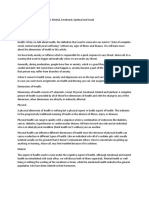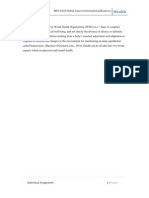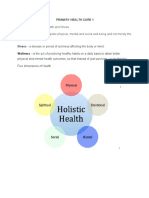Module-1 Good Health & It's Balance For Positive Mindset
Module-1 Good Health & It's Balance For Positive Mindset
Uploaded by
aman.kekkarCopyright:
Available Formats
Module-1 Good Health & It's Balance For Positive Mindset
Module-1 Good Health & It's Balance For Positive Mindset
Uploaded by
aman.kekkarOriginal Title
Copyright
Available Formats
Share this document
Did you find this document useful?
Is this content inappropriate?
Copyright:
Available Formats
Module-1 Good Health & It's Balance For Positive Mindset
Module-1 Good Health & It's Balance For Positive Mindset
Uploaded by
aman.kekkarCopyright:
Available Formats
Module-1
Good Health & It’s balance for positive mindset
Health
Health can be defined as a state of complete physical, mental, social and spiritual
wellbeing, which consists in maintaining the body as much as possible by following
daily advice and preventive measures to reduce the possibility of diseases.
Importance of Health
Health has an important role in feeling happy.
• Being healthy should be part of your overall lifestyle.
• Living a healthy lifestyle can help prevent chronic diseases and long-term
illnesses.
• Feeling good about yourself and taking care of your health are important for
your self-esteem and self-image.
• Maintain a healthy lifestyle by doing what is right for your body.
Good Health and positive mindset:
People with a healthy lifestyle are more liable to live positive attitude, since they have
a more optimistic belief towards the future.
Positivity is something that can change somebody’s way of thinking. Positive
thinking or an optimistic attitude is the process of focusing on the positive side of any
situation. Positive thinking plays an important role in an individual’s personality; it
might affect your physical and mental health. People who meditate daily are full of
life as it upbeats them every day. It doesn’t mean if you have positive thinking you
would ignore your problems, it means facing those problems with a positive attitude.
Factors affect the health:
Availaible at VTU HUB (Android App)
Many factors combine together to affect the health of individuals and communities.
Whether a person is healthy or unhealthy is determined by his/her circumstances and
environment.
1) Where we live,
2) The state of our environment,
3) Genetics
4) Our income and education level, and
5) Our relationships with friends and family
All of these mentioned factors have considerable impacts on health.
Health beliefs:
1. What people believe about their health
2. What they think constitutes their health
3. What they consider the cause of their illness and ways to overcome it.
4. Beliefs are culturally determined, and all come together to form larger health belief
systems.
5. The HBM attempts to predict health-related behavior in terms of certain belief
patterns.
6. A person’s motivation to undertake a health behavior is categorized: individual
perceptions, modifying factors, and likelihood of action
Advantageous of good health:
• Health is the body’s functional and metabolic efficiency, and its ability to adapt to
the physical, mental, and social changes that it is exposed to.
Availaible at VTU HUB (Android App)
• Health is the opposite of disease, and also means the safety of the body from
physical, social, and mental disorders.
• Health is the factor that helps a person performs his daily life tasks in a correct and
rightway.
• A person’s physical health means that the body does not have any diseases in all
parts of his body, and the safety of all its membranes.
• While mental and social health is represented by the ability of a person to
accomplish social tasks entrusted to him without defect or error. Health is the body's
functional and metabolic efficiency, and its ability to adapt to the physical, mental,
and social changes that it is exposed to.
Health is the opposite of disease, and also means the safety of the body from physical,
social, and mental disorders. Health is the factor that helps a person perform his daily
life tasks in a correct and right way. A person's physical health means that the body
does not have any diseases in all parts of his body, and the safety of all its
membranes.
While mental and social health is represented by the ability of a person to accomplish
social tasks entrusted to him without defect or error.
You may find the below 5 benefits if your long term health is pursued:
1. Decreased risk of disease. Disease in the body occurs when it’s stressed,
nutritionally imbalanced, and/or neglected of self-care. Often times, these occur
simultaneously. To bring the body back into a state of balance, it’s essential we begin
to adopt more sustainable behaviors. These behaviors are by no means difficult,
they’re just different than the ones you currently subscribe to. Remember, life is a
practice, not a performance.
2. More life-force energy. It is physically impossible for the body to have optimal
energy when inundated with poor quality foods, chemicals, and long term stress. Each
of these respond negatively in the body and inhibit its ability to sustain energy levels
for extended periods of time. Give the body what it requires and desires, such as
Availaible at VTU HUB (Android App)
wholesome nourishment, sunlight, clean water, and movement, and you will
experience a dramatic shift in your daily energy levels.
3. Increased happiness, less depression. The gut contains 100 million neurons and is
responsible for secreting major neurotransmitters like serotonin, dopamine, glutamate,
norepinephrine and nitric oxide. When we nurture the health of our gut, we invite
these feel-good chemicals to be secreted more easily and more frequently, thus
influencing the state of our mood.
4. Increased feelings of self-worth. As you begin to experience mood shifts and
desirable body changes, you will begin to make self-care a priority. Simple as that.
5. Save money. Leading a lifestyle of healthy behaviors allows for more money in
your pocket by increasing work productivity, eradicating doctor visits, and decreasing
missed work due to feeling ill and unwell. You’ll have extra funds to do things you
love with those you love!
Quite literally, there are infinite benefits one will receive by way of pursuing a
healthy lifestyle.
Other Important Benefits:
1. Helps You Live Longer
This is one of the most obvious benefits of living a healthy lifestyle and is one of the
main reasons why most people look to exercise and eat a healthy diet. For those
determined to get the most out of their body in terms of longevity, there is a whole
host of evidence that links staying healthy with longer life. One study went so far as
to estimate the link between only drinking alcohol in moderation, not smoking,
exercising regularly, and eating a healthy diet can extend your life by up to 14 years.
2. Feel Better About Yourself
One of the main reasons why staying healthy can be of assistance to your life as you
grow older. One of the main benefits is that living a healthy lifestyle can make you
Availaible at VTU HUB (Android App)
feel more confident than ever before. Exercising can release hormones to your brain
that enhance your mood and provide you with a sense of euphoria.
3. Life Insurance is Cheaper
One of the primary considerations you will have when you grow older is the need to
purchase life insurance to protect your family in the event of your death. You may be
you like term life insurance vs whole life insurance policies, but whichever you
choose, you will face lower premiums when you live a healthy lifestyle.
4. Control Your Stress
The modern world we live in is undoubtedly stressful, with the ability to switch off
from work being a significant problem. One of the issues facing us is how to handle
stress with exercise. Those who live a healthy lifestyle have been proven in clinical
studies to have lower levels of stress and anxiety.
5. Avoid Addictions
No matter what kind of addiction you are affected by, a healthy lifestyle filled with
exercise can limit your desire for the addictive substance. Whether your vice of choice
is food, drugs, or alcohol, you will find a runner’s high just as addictive.
6. Protect your Sight
This may not be a well-known aspect of living a healthy lifestyle, but your eyesight
can be protected by a healthy diet and a proper diet. Better vision as we age can be
obtained with regular cardiovascular exercise.
7. Lower Medical Costs
This may seem like a no-brainer, but by staying healthy, your medical bills will be
significantly lower. Lower medical costs will often lead to fewer debts and a higher
credit score.
8. Increase your Fertility
Availaible at VTU HUB (Android App)
If you are looking for a fertile future with lots of children, the gym is the place to go.
Studies conducted by Harvard University researchers showed a higher sperm level
among males who exercised regularly.
9. Consider your Self-Esteem
When you exercise regularly, you will usually find you look and feel better, leading to
a rise in your confidence. Higher self-esteem can lead to a more satisfying life.
10. Become a Good Example
Exercising regularly and living a healthy lifestyle will rub off on those around you.
When your children and grandchildren see you exercising and eating healthily, they
will be more likely to follow your example.
• A person's physical health means that the body does not have any diseases in all
parts of his body, and the safety of all its membranes. While mental and social health
is represented by the ability of a person to accomplish social tasks entrusted to him
without defect or error.
• Psychologically healthy people feel comfortable and happy in their lives and enjoy
life well.
• A person who suffers from mental illnesses always sees him as a gloomy and
pessimist and does not feel happy in his life and in his relationships with people.
While you see a healthy person enjoying happiness in his life, establishing his
relationships with people and showing love, kindness, and intimacy.
Health and Behaviour:
Health behavior refers to actions that an individual engages in that affect their health
either positively or negatively. These can be simple personal choices like hand
washing or more complex situations like choosing to live in an area with high air
pollution. Within the context of occupational health and safety, health behavior relates
Availaible at VTU HUB (Android App)
to how an employee behaves affecting health and safety and the influences of
employer behaviors or programs upon employee health. Health behaviors, sometimes
called health-related behaviors, are actions taken by individuals that affect health or
mortality. These actions may be intentional or unintentional, and can promote or
detract from the health of the actor or others. Actions that can be classified as health
behaviors are many; examples include smoking, substance use, diet, physical activity,
sleep, risky sexual activities, health care seeking behaviors, and adherence to
prescribed medical treatments.
Health behaviors are frequently discussed as individual-level behaviors, but they can
be measured and summarized for individuals, groups, or populations. Health
behaviors are dynamic, varying over the lifespan, across cohorts, across settings, and
over time. With smoking in the U.S, for example, the likelihood of initiation varies
with age. Recent cohorts of adults are less likely to smoke than those in the mid-
1900s, smoking prevalence is higher in the south than in the west, and smoking
became less common after the Surgeon General’s Report of 1964. Health behaviors
are actions individuals take that affect their health. They include actions that lead to
improved health, such as eating well and being physically active, and actions that
increase one’s risk of disease, such as smoking, excessive alcohol intake, and risky
sexual behavior.
Health and Society:
• Health is essential to eradicating extreme poverty and promoting growth of well-
being
• The analysis show that over past decade, health improvements constitutes 24% of
full income growth in low-and middle- income countries.
• People who fit into society are likely to be more content and healthier even in the
most affluent countries.
Health and family:
• Umberson (1987) states that family members influence health behaviours through
indirect and direct control mechanisms.
Availaible at VTU HUB (Android App)
• Family members may also directly regulate one’s health behaviour by physical
means and supportive behaviours.
• Every family member can influence another family member’s health attitudes and
behaviours through communication.
• Research reveals that a critical comment from family members predicts the chance
of relapse in depression, eating disorders, and schizophrenia.
• Family members can support our decision to enact healthier behaviours
Health and personality:
Through its influence on thoughts, emotions, behaviours, and environments,
personality is one of the best psychological predictors of physical health.
• Personality is measured using the Big Five framework made up of extroversion,
conscientiousness, openness, neuroticism, and agreeableness
• The disordered personality was significantly predictive of worse physical
functioning, role limitations, fatigue, and pain.
• In the workplace, your personality affects how you interact with your colleagues,
managers, and clients and it may also have an impact on your earnings potential, your
career trajectory, and job satisfaction. Disparities of health in different vulnerable
groups
• Health disparities adversely affect groups of people who have systematically
experienced greater obstacles to health based on their racial or ethnic group; religion;
socioeconomic status; gender; age; mental health; cognitive, sensory, or physical
disability; sexual orientation or gender identity; geographic location;
• In India the vulnerable groups that face discrimination include Women, Scheduled
Castes (SC), Scheduled Tribes (ST), Children, Aged, Disabled, Poor migrants, People
living with HIV/AIDS and Sexual Minorities.
Health and Psychology:
Availaible at VTU HUB (Android App)
• Health psychology is the study of psychological and behavioral processes in health,
illness, and healthcare.
• It is concerned with understanding how psychological, behavioral, and cultural
factors contribute to physical health and illness. Psychological factors can affect
health directly.
• Psychological factors can affect health directly.
• The goal of health psychology is to apply health education, information, prevention,
and control in ways that will alleviate patients’ physical symptoms and improve their
lives.
Psychological disorders (Stress and Health – Stress management):
• Stress can be defined as any type of change that causes physical, emotional, or
psychological strain.
• Stress is your body’s response to anything that requires attention or action.
• Signs: Psychological, Emotional, Physical & Behavioural.
Types of Stresses
• Acute stress is a very short-term type of stress that can either be positive or more
distressing; this is the type of stress we most often encounter in day-to-day life.
• Chronic stress is stress that seems never-ending and inescapable, like the stress of a
bad marriage or an extremely taxing job.
• Episodic acute stress is acute stress that seems to run rampant and be a way of life,
creating a life of ongoing distress.
• Eustress is fun and exciting. It’s known as a positive type of stress that can keep you
energized. It’s associated with surges of adrenaline, such as when you are skiing or
racing to meet a deadline.
Availaible at VTU HUB (Android App)
Methods to improve good psychological health:
Learn to recognize the signs of burnout. High levels of stress may place you at
a high risk of burnout. Burnout can leave you feeling exhausted and apathetic
about your job.
When you start to feel symptoms of emotional exhaustion, it’s a sign that you
need to find a way to get a handle on your stress.
Try to get regular exercise. Physical activity has a big impact on your brain
and your body. Exercise reduces stress and improves many symptoms
associated with mental illness.
Take care of yourself. Incorporating regular self-care activities into your daily
life is essential to stress management. Learn how to take care of your mind,
body, and spirit and discover how to equip yourself to live your best life.
Practice mindfulness in your life. Mindfulness isn’t just something you
practice for 10 minutes each day. It can also be a way of life. Discover how to
live more mindfully throughout your day so you can become more awake and
conscious throughout your life.
Changing health habits for good health:
The following ways can help you achieve good health:
Eat healthy meals:
Availaible at VTU HUB (Android App)
What you eat is closely related to your health. Eating a healthy diet can help boost
your immune systems, help you maintain a healthy weight and can improve your
overall health.
Add more fruits and vegetables to your diet:
Include fruits, vegetables, grain products, leafy greens, salmon, etc. in your diet.
Adding fruits and vegetables is an ideal basis to start a healthy routine.
Drink a lot of water:
Drinking a lot of water keeps muscles and joints working, increases the amount of
water in your blood, promotes healthy skin and cardiovascular health and helps
cleanse toxins from your body. You can save a lot of money and improve your health
by drinking water all day.
Get regular exercise:
Do a moderate workout for at least 30 minutes a day, as exercise can help prevent
heart disease, stroke, colon cancer, and diabetes.
Lose your extra weight:
Lose weight if you are overweight. If you want to lose extra weight, you have to
reduce the number of calories you consume, so you have to become a good record
keeper. If you are obese, losing weight can mean "less heart disease, less cancer and
less diabetes.
Wash your hands before eating a meal:
Hand washing before eating is a good habit and an effective way to prevent infection.
If you eat something without washing your hands, it is possible that the bacteria and
germs that remain on your fingers and palms can be moved into your mouth. This can
affect your overall health and cause diseases and infections.
Protect your skin:
Availaible at VTU HUB (Android App)
Your skin is the first layer of defense in the body, and you need to protect it. In
summer, a lot of sunlight is very harmful to your skin cells because UV rays damage
or even kill your skin cells. In winter, fluctuations, redness, allergies and irritation are
common skin diseases among many of us. Cold temperatures and low humidity levels
create dry air that pulls moisture away from the skin. Therefore, protect your skin in
both seasons.
Get enough sleep:
Sleep plays an important role in good health and well-being throughout your life
because it enables the body to repair and be fit and ready for another day. Getting
enough sleep at the right times may help prevent physical health problems such as
excess weight gain, heart disease, protect your mental health issues and improve your
quality of life and safety.
Prevent substance abuse:
Avoid smoking, tobacco, alcohol, caffeine and sugary drinks. Smoking, alcohol, and
tobacco consumption are harmful to your health, so avoid such things as soon as
possible. When you quit, you will greatly reduce the risk of death from lung cancer
and other life-threatening diseases such as heart disease, stroke, emphysema, chronic
bronchitis, etc.
Make your lifestyle choices better:
You can understand what you should do to enjoy a healthy, happy life. Poor lifestyle
choices contribute significantly to the development and progression of preventable
chronic diseases. Improve your lifestyle, adopt healthy lifestyle choices and create
good and healthy habits so that you can make healthy changes in your life. Carve out
time to exercise and find a way to ratchet down stress and depression.
Availaible at VTU HUB (Android App)
You might also like
- Activity Proposal For NutritionDocument2 pagesActivity Proposal For NutritionMarlyn E. Azurin0% (1)
- A Case: Balanced SnackingDocument9 pagesA Case: Balanced Snackingburi ket tamNo ratings yet
- HEalth M1Document6 pagesHEalth M1vijeth.inNo ratings yet
- PE1 Module Week 1Document7 pagesPE1 Module Week 1마이No ratings yet
- PE1 Module Week 1Document10 pagesPE1 Module Week 1마이No ratings yet
- What Is Health?Document6 pagesWhat Is Health?Respecio MjoyNo ratings yet
- Health and Wellness Notes 1 EditeDocument13 pagesHealth and Wellness Notes 1 EditeSOCIAL PLACENo ratings yet
- Health and Wellness Definition of HealthDocument8 pagesHealth and Wellness Definition of Healthyushany8No ratings yet
- Health Is Wealth Essay For Students and ChildrenDocument7 pagesHealth Is Wealth Essay For Students and ChildrendrmdaudawanNo ratings yet
- Dr Ojo GST 106 COURSE MATERIALDocument14 pagesDr Ojo GST 106 COURSE MATERIALdolapoogunmefun61No ratings yet
- Health Is Wealth: Essay No. 2Document4 pagesHealth Is Wealth: Essay No. 2Krishna Abhilash100% (1)
- Dimensions of HealthDocument4 pagesDimensions of HealthJasper Pangilayan OrañolaNo ratings yet
- Importance of Healthy LivingDocument5 pagesImportance of Healthy LivingljmcalvinNo ratings yet
- Activity 2 FinalDocument19 pagesActivity 2 FinalJunaiza Adrayan MariNo ratings yet
- PFT ManualDocument20 pagesPFT ManualCriziaClaire CosmeNo ratings yet
- Generation Global - Health and Well BeingDocument4 pagesGeneration Global - Health and Well BeingpranjalsoniasoodNo ratings yet
- PE Definition of HealthDocument3 pagesPE Definition of HealthHahahaNo ratings yet
- Christine TayDocument15 pagesChristine TayTay TingNo ratings yet
- Choosing To Be HealthyDocument2 pagesChoosing To Be HealthyCassidyNo ratings yet
- HEALTHDocument2 pagesHEALTHletrankimanhn2k25hlkNo ratings yet
- Health 7 Module FinalizeDocument10 pagesHealth 7 Module Finalizeronnie yagoNo ratings yet
- Article on Health and FitnessDocument9 pagesArticle on Health and FitnessEverything ChannelNo ratings yet
- Health and Well BeingDocument32 pagesHealth and Well Beinganshuaakriti004No ratings yet
- Esquero, Maecy Anne Victoria D. Bs Architecture 2ADocument3 pagesEsquero, Maecy Anne Victoria D. Bs Architecture 2AluffyNo ratings yet
- Chapter 1Document55 pagesChapter 1hockeyguy5573No ratings yet
- Lifestyle ChoicesDocument5 pagesLifestyle ChoicesarpankaurspammsNo ratings yet
- Health and Fitness Articles 2Document4 pagesHealth and Fitness Articles 2ᴅꜱʀ ɪꜱ ʙᴀᴄᴋNo ratings yet
- Your Health, Your Way - Simple Lifestyle Changes for Optimal Well-BeingFrom EverandYour Health, Your Way - Simple Lifestyle Changes for Optimal Well-BeingNo ratings yet
- Alekzynne Nonog: Submitted byDocument5 pagesAlekzynne Nonog: Submitted byjingky SallicopNo ratings yet
- Living A Balanced LifeDocument17 pagesLiving A Balanced LifeAbdul Rahman Khan MohammadNo ratings yet
- Primary Health CareDocument13 pagesPrimary Health CareJeanNo ratings yet
- E Notes Dimension of Health 2Document4 pagesE Notes Dimension of Health 2Jenesha MuraliNo ratings yet
- Lesson 1 Physical Fitness and Related ActivitiesDocument31 pagesLesson 1 Physical Fitness and Related ActivitiesKaiNo ratings yet
- SFH Module IDocument15 pagesSFH Module Inandinipatted91No ratings yet
- In Order To Achieve Their Optimal Level of WellnessDocument3 pagesIn Order To Achieve Their Optimal Level of WellnessVINCENT MUHARINo ratings yet
- HEALTH AND UNHEALTHY BEHAVIOURSDocument16 pagesHEALTH AND UNHEALTHY BEHAVIOURSiampathetic0No ratings yet
- NSTP Lesson 6Document46 pagesNSTP Lesson 6jessa taasanNo ratings yet
- Exploring The Determinants Interventions and Dimensions of Health 2023 7 24 5 52 41Document20 pagesExploring The Determinants Interventions and Dimensions of Health 2023 7 24 5 52 41Trailers of moviesNo ratings yet
- Act Of, How It's Linked To Health: Module 2: WELLNESSDocument10 pagesAct Of, How It's Linked To Health: Module 2: WELLNESSHyacenth Claire TumbaliNo ratings yet
- The7EssentialStepsBusyPeopleTake 2014 PDFDocument21 pagesThe7EssentialStepsBusyPeopleTake 2014 PDFrabfireboltNo ratings yet
- HealthDocument2 pagesHealthveruvanekNo ratings yet
- How to Become More Healthy: Your Path to a Healthier You! Hidden Treasures of Health, Energy, and Long LifeFrom EverandHow to Become More Healthy: Your Path to a Healthier You! Hidden Treasures of Health, Energy, and Long LifeNo ratings yet
- A Healthy LifestyleDocument3 pagesA Healthy Lifestyle• LyaMew •No ratings yet
- Health ImportanceDocument3 pagesHealth ImportanceMoataz abd el fattahNo ratings yet
- Wellness and FitnessDocument2 pagesWellness and Fitnesstenten desarapenNo ratings yet
- Nutrition and WellnessDocument24 pagesNutrition and WellnessArianne Rose FangonNo ratings yet
- Health Belief and Health PracticesDocument18 pagesHealth Belief and Health Practicesk ucheNo ratings yet
- Hábitos SaludablesDocument5 pagesHábitos SaludablesOliver Edgardo Corado GonzálezNo ratings yet
- Pathfit 1 Lesson 1Document8 pagesPathfit 1 Lesson 1explorers.beamaepetracortaNo ratings yet
- Healthy LifestyleDocument2 pagesHealthy Lifestyleunnatiarya01No ratings yet
- Julia's PresentationDocument13 pagesJulia's PresentationJulYan 0711No ratings yet
- What Is Healthy Lifestyle 4Document2 pagesWhat Is Healthy Lifestyle 4John Rey BandongNo ratings yet
- A Healthy LifestyleDocument4 pagesA Healthy LifestyleAbdouNo ratings yet
- How To Be Happy AloneDocument34 pagesHow To Be Happy AloneOluwapelumi DavidNo ratings yet
- How Can Holistic Health Benefit MeDocument2 pagesHow Can Holistic Health Benefit Meanna ticaNo ratings yet
- Faculty of Business School: Name: Matrix No: Contact No: EmailDocument23 pagesFaculty of Business School: Name: Matrix No: Contact No: EmailNOOR AIN WAHIDA BINTI MAT STUDENTNo ratings yet
- Tugas 4 - Fahlida Harnita - KSEUnsyiahDocument4 pagesTugas 4 - Fahlida Harnita - KSEUnsyiahDoni LaksitaNo ratings yet
- Probiotics, Prebiotics and Synbiotics For Weight Loss and Metabolic Syndrome in The Microbiome EraDocument18 pagesProbiotics, Prebiotics and Synbiotics For Weight Loss and Metabolic Syndrome in The Microbiome EraMauricio DiazNo ratings yet
- 7775 22226 1 PBDocument6 pages7775 22226 1 PBdriveamadeaNo ratings yet
- Relation Between Eating Habits and A High Body Mass Index Among Freshman Students: A Cross-Sectional StudyDocument9 pagesRelation Between Eating Habits and A High Body Mass Index Among Freshman Students: A Cross-Sectional StudyNori Bel Cambia GonzalesNo ratings yet
- TrainChange Fitness Introduces Revolutionary New Product Line, ALLN-1Document2 pagesTrainChange Fitness Introduces Revolutionary New Product Line, ALLN-1PR.comNo ratings yet
- Paper Sarcopenia Obesity SurgeryDocument9 pagesPaper Sarcopenia Obesity SurgeryFrancesca FilippiNo ratings yet
- Carlo G. AlmazarDocument241 pagesCarlo G. AlmazarJeffreydanceljr100% (1)
- Argument EssayDocument6 pagesArgument Essayapi-246731403No ratings yet
- PCOS Diet and NutritionDocument12 pagesPCOS Diet and NutritionRhiannon ProcktorNo ratings yet
- CHES Practice Exam QuestionsDocument34 pagesCHES Practice Exam QuestionsgichaucarenNo ratings yet
- School Form 7 (SF7) School Personnel Assignment List and Basic ProfileDocument99 pagesSchool Form 7 (SF7) School Personnel Assignment List and Basic ProfileOda GretchNo ratings yet
- NFL Play 60 AdobepdfDocument55 pagesNFL Play 60 Adobepdfdct5036No ratings yet
- HOPE 1 - Lesson 1-5 Final EditedDocument57 pagesHOPE 1 - Lesson 1-5 Final EditedreymartNo ratings yet
- Pediatricobesity: Etiologyandtreatment: Melissa K. Crocker,, Jack A. YanovskiDocument24 pagesPediatricobesity: Etiologyandtreatment: Melissa K. Crocker,, Jack A. YanovskiAyline Araceli AlavaNo ratings yet
- Literature Review On Health and FitnessDocument8 pagesLiterature Review On Health and Fitnessafmzrsqklrhbvb100% (1)
- JemrelDocument4 pagesJemrelPrincess Anne Batalona CortezNo ratings yet
- US B.Inggris 2011-2012Document9 pagesUS B.Inggris 2011-2012YULIANo ratings yet
- IELTS Writing - Cause and EffectDocument6 pagesIELTS Writing - Cause and Effectdeathnote lNo ratings yet
- Family Nursing Care Plan - HypertensionDocument3 pagesFamily Nursing Care Plan - HypertensionBiway RegalaNo ratings yet
- Acog Practice Bulletin: Pregnancy and Heart DiseaseDocument37 pagesAcog Practice Bulletin: Pregnancy and Heart Diseasereham mohamedNo ratings yet
- 3QHealth 7 - Lesson 3 - Malnutrition and Micronutrient DeficiencyDocument6 pages3QHealth 7 - Lesson 3 - Malnutrition and Micronutrient DeficiencyKirk RamosNo ratings yet
- SHN Learning Resource - NutritionDocument14 pagesSHN Learning Resource - NutritionJammer AquaNo ratings yet
- Morbid Obesity - Anaesthetic Management: Prevalence and EpidemiologyDocument8 pagesMorbid Obesity - Anaesthetic Management: Prevalence and EpidemiologyLorena GarcíaNo ratings yet
- Antidiabetic Effect of Ipomoea Batatas in Normal ADocument11 pagesAntidiabetic Effect of Ipomoea Batatas in Normal AFara AzzahraNo ratings yet
- TG - Pe 10 - Q4Document77 pagesTG - Pe 10 - Q4Honey NakilaNo ratings yet
- B.ingg Cause and EffectDocument6 pagesB.ingg Cause and EffectAngga RizkiNo ratings yet
- Maternal and Early-Life Nutrition and HealthDocument4 pagesMaternal and Early-Life Nutrition and HealthTiffani_Vanessa01No ratings yet
- Bac SC English 2021Document4 pagesBac SC English 2021عمر أحمدNo ratings yet
- OBESITAS PADA REMAJA (Pengaruh Fast Food Terhadap Remaja)Document8 pagesOBESITAS PADA REMAJA (Pengaruh Fast Food Terhadap Remaja)Istysagitariusgirl Ambigoo LuversNo ratings yet

























































































